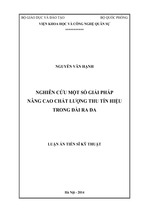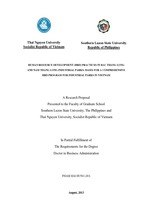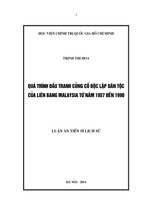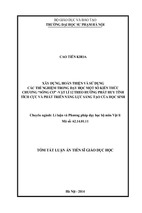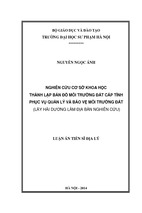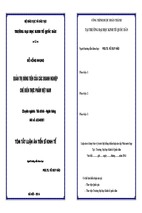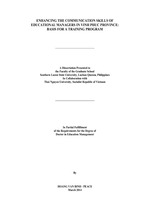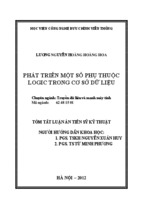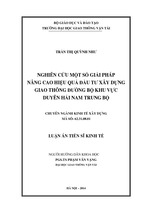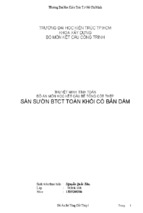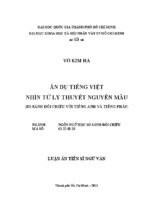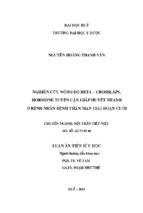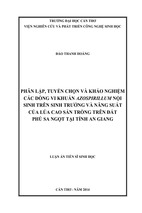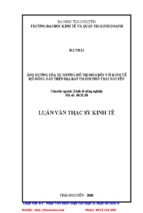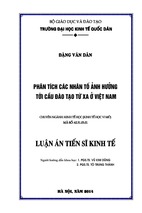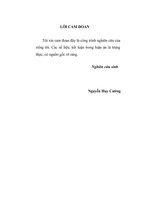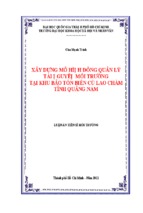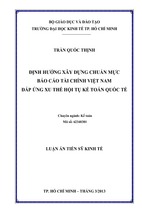MINISTRY OF EDUCATION AND TRAINNING MINISTRY OF JUSTICE
HANOI LAW UNIVERSITY
VU PHUONG DONG
THE LEGAL ISSUES ON ECONOMIC GROUP
IN VIET NAM
FIELD OF STUDY
CODE
: ECONOMIC LAW
: 62 38 01 07
ABSTRACT OF DOCTORAL THESIS ON LAW STUDIES
HA NOI – 2015
Trainning Institution:
HANOI LAW UNIVERSITY
Academic Supervisors
:
1. Dr. Nguyen Thi Dung
2. Dr. Dong Ngoc Ba
Opponent 1
:
Prof.Dr. Nguyen Thi Mo
Opponent 2
:
Assoc.Prof.Dr. Nguyen Nhu Phat
Opponent 3
:
Dr. Nguyen Thi Nhung
Thi thesis will be defended before the University Thesis Evaluation
Board at Hanoi Law University, dated
This thesis can be available at:
1. National library of Vietnam
2.
Library of Hanoi law University
PREAMBLE
1. Urgency of the subject
Since the 6th National Party Congress-1986, the twenty-five years of develtiopment under
new economic model, facilitated Vietnam to become a country with high economic growth,
improved social life, also the concept of business has been changed a lot. Through a process of
almost twenty year development, a number of enterprises in the State sector as well as in the
private sector experienced strong growth, and long-term capital accumulation; M&A (mergers
and acquisitions), consolidation has occurred frequently with the support of the stock market.
Moreover, demand for investment-linked that performing complex form and multidisciplinary
business needs have become topical. These have posed the following problems to be solved: the
model of economic organization which has been operating so far has not meet the requirement to
raise capital, specialized production and business management. In fact, the model of Economic
Group (hereafter referred to as “EG”) have been appeared in Vietnam and partly meet the needs
of investors in both the State and private sector.
In the State sector, the Government did implement the policy of transition General
Company 91 to Economic Group. Hence a number of EGs have been established including the
Vietnam Oil and Gas Group, Vietnam National Coal – Mineral Industries Holding Corporation
Limited (Vinacomin), Vietnam Electricity (EVN), etc. After the Government established pilot
EGs and issued Decree No 101/2009/ND-CP dated 5th November 2009 of the Goverment on
piloting the establishment, organization, operation and management EGs, on the one hand State
owned EGs had continuous movement in many different directions. However, on the other hand
a few State owned EGs did operate inefficiency, and have not meet the expectations of the
Government that would consider the model EGs being a key solution in economic development
strategies throughout the comprehensive integration period. Furthermore, certain corporations
adversely created a burden for developing countries, causing losses of the budget, increasing the
ratio of Government debt, which reduces the effective indicator of investment, creating complex
and adverse implications on society such as the case of Vinashin (). Decree 69/2014 /ND-CP
dated…… of the Government, to some extent, has contributed unified regulations on the State
owned EGs. There are, moreover, many other texts provisions on the use of and investment in
the State capital have been issued. However, the effectiveness of the implementation of the law
1
on State owned EGs still not effectively and the issued relating to State owned EGs have not
been fixed thoroughly.
Meanwhile, enterprises in the private sector are actively switching to model EGs: FPT,
Hoa Phat Group, Hoang Anh Gia Lai Group, Group CEO, etc ... However, the current legislation
on private EGs is not systematic. For private sector EGs, except four articles in current
Enterprise Law (which is full effect on 01 July 2015) (here after referred to as “Enterprise Law
2014”) and an article specified in the Decree No 102/2010ND-CP dated 1st October 2010 of the
Government guiding the Enterprise Law 2005, there was still no specific regulations on this
model. The private EGs hence have been difficult to deploy business operations including
internal corporate governance. However, as the inevitable trend of development, private EGs
model could become the new driving force for the models replacing State owned
EG in
economic development strategy in Vietnam in the coming time. For that reason, the immediate
construction of legal system forming the basis for the implementation of the restructuring EGs is
an urgent need
For the above mentioned reasons I have decided to choose subject "The legal issues on
Economic Group in Vietnam" as the subject of my PHD research.
2. The purpose of research and tasks of the thesis
The purpose research thesis is to analyze and evaluate legal issues on EGs model
therefore finding appropriate solutions perfecting legislation on EGs in Vietnam.
To accomplish this goal, the task of the thesis laid out following specific research issues:
Firstly, the thesis studied the economic nature, the legal nature of EGs thereby
determining the specific characteristic of this business model;
Second, the thesis studied the development process, analyzing the dominant factors and
determines the basic content of the legislation on EGs;
Thirdly, the thesis researched models and laws in foreign countries around the world,
from which compare, evaluate and drawn valuable lessons for the process of law making on EGs
in Vietnam.
Fourth, the thesis researched and assesses the status of legislation on the link of EGs
formation, the establishment of the rights and obligations of the participating enterprises in EGs,
the monitoring mechanism of the State and operation termination of EGs. These studies are the
basis for the thesis proposing practical solutions.
2
Fifth, the thesis showed the complete solutions for perfecting the EGs legislation
including basic solutions and detail solutions.
3. Scope of Research
Economic Group is a special model of economic organization and is also the researching
object of many different industries and fields including economics, finance, administration and
legal. In specialized economic law, the scope of the author's research thesis on this topic focused
on the legal provisions of model EGs.
In terms of content, the thesis focused on the legislation on EGs to be able to assess the
matters/issues on EGs’ the status, establishment, operation, management and administration.
These provisions were studied in contract law systems, business law, competition law,
procurement law, the law on intellectual property.
The thesis studied regulations on State owned EGs and model of private EGs. The
similarity of the two models is in nature however the provisions on the State owned EGs model
overwhelmed as compared to the private EG’s ones. The parallel studying of the two models lay
the foundation that the making thesis evaluate and propose appropriate for each type of model
and then narrowing of operation of State owned EGs and as consequently give priority to TDKT
private EGs.
The thesis focused primarily studies the domestic legal provisions and after that analyzes,
gave comment on the provisions of foreign laws to draw the necessary lessons for the
construction and then improved the Vietnamese legal system.
The thesis focused study of current legislation in order to accurately assess the status of
laws. However, to ensure the feasibility of the recommendations, the thesis also studied the
movement and development of the legal system on EGs.
4. Research Methodology
To perform the research tasks of the thesis, the author did apply specific research
methods being appropriate for each respectively content, including methods of analysis,
synthesis, statistics, logic, history, compare, etc. in order to clarify the issues studied. Including:
Methods of analysis, logic synthesis are used in the entire contents of the thesis;
Historical and comparison methods, were used in research history and development of
legislation on EGs;
3
Comparison method used in researching the model and legislation of EGs in a number of
countries over the world.
Statistical method used in the assessment of the current legal situation in Chapter III of
the thesis.
5. New scientific contribution of the thesis
As scientific research on EGs legal system, the author desire to contribute his new view
for the legal science as follows:
First, the thesis contained scholarly research and the views of the author's thesis on the
legal status and position of EGs. This is an much important matter as the basis for building
regulations EGs;
Second, the thesis clarified the nature of the link from various aspect in EGs as capital,
the brand link, technology links, market link;
Third, the thesis provided solutions
and opinion as to rights of management,
transactional and legal issues, the relationship between the parent company and its subsidiaries,
the relationship between companies in the same grade in EGs were clarified in the thesis content;
Fourth, while the issued shown are solved, the thesis proposed the solution to perfect and
improve the legislation in the current period on restructuring State owned EGs, to the private
EGs develop positively.
6. Structure of the thesis
Besides preface and conclusion, the thesis includes the following specific contents:
Chapter 1: Overview of Research topics
Chapter 2: The theoretical issues of Economic Groups and Legislation on Economic
Groups
Chapter 3: Status of legislation on Economic Groups in Vietnam
Chapter 4: The direction and solutions to complete the legislation on Economic Groups in
Vietnam
CHAPTER 1: OVERVIEW OF THE RESEARCH TOPICS
The topic of “Economic Group” is not a new topic. There have been a number of studies
on this topic. However, these study were primarily from an economic perspective, and
specializing in business management, public management. Various studies often focused on the
4
internal link in the Group, the administrator governance in the Group, the effective usage of
corporate resources.
In this Research, the following Basic contents resolved:
First, the authors focused studying and presenting the concept of EGs under two angles:
the economic perspective on the basis of the studies mentioned above, and a legal perspective on
the basis of the author’s in-depth study. Based on EGs reviewing from many aspects, the thesis
author plans to build a legal concept of "Economic Group". The thesis also spent appropriate
time to specific the legal position and status of EG. This is an issues facing many obstacles,
many different concepts, is at the core of arguments about EG.
Second, the thesis focused on the legal provisions on connective links in EGs: capital
link, industrial property rights link and a number of other forms of association. The author did
also put attention to other contents to explain more about internal links within the Group. The
author clarified the nature of each type of link, the characteristics, the dominant factors, and the
provisions of the law on these links. Through the clarification on the links in the Group, the
author’s ambition is to clarify the diverse nature of EGs’ the operation in Vietnam
Third, the thesis studied the provisions of the law on the establishment of State owned
EGs and private EGs. The formation of the State EGs from administrative orders and the
conversion from model of General Companies (“Tổng Công ty”) has created unsound problems.
The thesis thus focused on analyzing the shortcomings to suggest towards perfection. Relating to
private EGs, the process of establishing has not been supported by specific regulations that
causing confusion about the name of the group. A few opinions of regulations on the scale of
group was suggested but not yet specified. The author's thesis analyzed and clarified that
situation and proposed his own specific recommendations for private EGs.
Fourth, the author’s research also focused on relationship among entities in EGs, rights
and obligations of enterprises in EGs. Accordingly the author planned to focus in-depth analysis
and clarification of management activities in the State EGs between the parent company and its
subsidiaries, affiliated companies in EGs, especially the responsibilities of the parent company in
the use of State invested capital and the capital allocation to its subsidiaries, affiliated companies
in EGs. In terms of private EGs, for the reason that there have been so far no regulations on
operating activities and the private EGs currently depend on the investors ‘rights to freely
conduct business, the author still studied generally. Throughout this content, the author clarified
5
the issues relating to rights of management, transaction, legal issues between the parent company
and its subsidiaries, the relationship between the enterprises in the same grade in EGs, the single
level investment, multi-level investment.
Fifth, since the problem was resolved thoroughly, the thesis presented recommendations
to improve the legal system and boost the effectiveness of EGs’ operations. These solution
would be both comprehensive and detail to ensure the feasibility of the implementation process.
CHAPTER 2: THE THEORETICAL ISSUES OF MANAGEMENT AND LEGISLATION ON
ECONOMIC GROUP
2.1. SOME ISSUES OF MANAGEMENT ON ECONOMIC GROUPS
2.1.1. The concept of “Economic Group”
A series of concept on “economic group" or "Business Corporation" have been presented,
but mainly approaching from economic perspective. Based on general concept, “Economic
Group” is defined as a large-scale organization, conducting business activities in
multidisciplinary and multi-sector,
based on links formed investment, capital contribution,
merger, acquisition, reorganization or others business links to agglomeration and accumulate
resources in order to increase competitiveness and profit maximization”.
From legal perspective, EGs should be defined as follows:
"The Group is a consortium of economic links between independent legal entities on the
basis of investment and contractual agreements linked. Investment activities and contractual
agreements create rights and obligations for each member of the consortium, including the legal
entity holding dominant/controlling powers, and the other subsidiaries and affiliates (the legal
entities are controlled)”.
2.1.2. Characteristics of Economic Group
2.1.2.1. Economic Group formed as a consortium, from the links between independent
business entities
Economic Groups are formed on the basis of the link between business entities. Business
entities are independent legal entities. Links between business entities in the consortium are
specified in the contractual agreement.
The link among the legal entities of the group is completely different from the link
between members of the company. The link between the members of the group can be
controlling or not.
6
First, the tight link, controlling link: (i) Links governed through equity investment; (ii)
Links governed by controlling rights of the company’s business; (iii) Controlling Link through
the transfer of rights relating to industrial property and some other rights.
Second, the link is not controlling
2.1.2.2. Economic Group owning identity but no legal status
EGs is a consortium whose identity. The identity is set to define independent legal entity,
operating on the basis of close links because of the economic benefits. From the nature of links
in EGs and from legal perspective, it can be seen that EGs have no legal status:
2.1.2.3. Economic groups have complex organizational structures, multiple levels
The organizational structures of corporations aim to harmonize the companies’ interests
in the Group. EGs have more than one level. Level one consists of the original controlling
company (parent company – Grade 1) controls the Grade 2 enterprises (the subsidiary level).
Level three covers controlling enterprises – Grade 2 enterprises and the Grade 3 controlled
enterprises (be controlled by the Grade 2 enterprises) which controlled by the parent company.
The huge Groups usually have no limit on the number of levels in the group, which resulted in
the number of companies in very large scale
2.1.2.4. Economic groups holding a huge scale, a large number of employees, wide
operating range, diversified businesses, higher revenue.
EGs with the accumulation of capital of companies in the group, including the parent company,
subsidiaries, affiliates, associated companies. Because the enterprises in the Group operating in
diversified sectors, the Group holds a large scale workforce. Workforce is clearly categorized
from simple workers to intellectual labor with creative expertise from medium to high
qualification. Most of EGs are multidisciplinary and multi-sector including a number of lines is
core business. EGs conduct large-scale investment, wide operating range, good competitive
advantage, high level of management, profit maximization.
2.1.3. Classification links in Economic Group
In terms of criteria on the cause of forming, links in EGs can be divided in 02 categories:
natural formation link and link from administrative decisions.
In terms of criteria on competitive relationship in the market, links in EGs can be divided
in vertical link and horizontal link.
7
In terms of criteria of management method, links in EGs can be divided in links between
the parent company and its level I subsidiaries, link among cross-ownership companies.
2.1.4. The role of Economic Group in market economy
The establishment and development of the EGs in all over world as well as in Vietnam is
to meet the constantly changing of geo-political and cultural conditions. The model of Economic
Group plays a significant role in the development of each country's economy and also the global
economy.
First, EGs are the basis for the establishment and development of large scale business
models.
Secondly, EGs are one of the State’s tools to implement State economic structural
adjustment
Thirdly, EGs enhance the competitiveness, economic and international integration..
Fourthly, EGs improve the efficiency of science and technology.
Fifth, EGs will be responsible for implementing employment, social security
2.1.5. Model of economic groups in some countries in the world
Most of the EGs all over the world have naturally established, on the basis of capital
accumulation. A number of groups have undergone a long process of development under the
impact of complex business conditions, continuously changing business environment. Political
factors, geography, economy, culture, have also impact on the establishment of different
countries. Model of EGs in Britain, America, Japan, Korea, China, have its own characteristics.
Each country has a large selection of ways to develop the nature EGs of the economy, but just a
few select the State owned model. In fact, the EGs promote the development of the country but
also have implications for the natural development of the market, even; model EGs in countries
including South Korea, China; has been creating relatively complex and adverse consequences
for the economy.
2.2. THEORETICAL ISSUES OFLEGISLATION ON ECONOMIC GROUP
2.2.1. The Legal view on Economic Group
The legislation on EGs is in the overall system of regulations established business
institutions. From broad or narrow sense, legislation on Economic Group has different
connotations.
Firstly, from the broad view
8
The process of EGs’ operations have generated relation on land, competition, tax,
environmental, labor, credit and other subjects. Thus, in the broad view sense, it can be
understood:
"The legislation on EG is the system of regulations governing the social relationship
arising in the process of formation and movement of EG."
Second, in the narrow sense
”The legislation on EG is the system of regulations governing the social relationship
arising in the process of formation, movement and termination of the internal link in EG".
Legislation on EGs include two major content: firstly, legislation on investment contract bond to
form links; secondly, legislation on associate administration. In particular, the laws on contract
and investment belong to legal system on civil law, corporate, intellectual property rights,
investment, and competition. Laws on link governance being the provisions on the powers and
responsibilities of the owner, representative mechanism are stipulated in corporate law.
2.2.2. Contents of legislation on Economic Group
Content of legislation on Economic Group includes 04 basic issues:
Firstly, the provisions on the legal nature of EGs.
Secondly, the provisions on the links in EGs in which there are links formed from equity
investment activities, links formed on the basis of contractual agreements.
Third, the rights and obligations of the members in EGs, especially the relationship
between the parent company and its subsidiaries .
Fourthly, the provisions on inspecting and supervising activities of the EGs.
Due to the complex nature and for the objectives of management, supervision and
preserve capital in the State owned EG, the legislation on State EGs is more specific and more
administrative nature. Laws on State EGs have the following specific and certain characteristics:
Firstly, standards, conditions and procedures to establish State owned EGs.
Secondly, the rights and obligations of the parent company, subsidiaries, and affiliated
companies in State owned EGs.
Third, the restructuring of State owned EGs.
2.2.3. Overview on development of EGs laws in Vietnam
The preparation period of economic and legal for the establishment of EGs (between 1975 and
1993)
9
The period of basically established EGs (from year 1994 to 2004)
The pilot period of establishment and development of EGs model (from the year 2005 to
2012)
The period of thoroughly developing the EG model (from 2012 to present)
2.2.4. The element controlling the legal system on EG
Legislation on EGs has been strongly influenced by political factors, culture, society,
customs, and so on. In particular, the fundamental factors affecting include:
2.2.3.1. Economic institutions
Institution of socialist-oriented market economy in Vietnam today, with its own
characteristics, has affected the development of legislation on EGs. The State owned EGs were
assigned a large amount of capital to implement business and production activities. State owned
EGs also received the support and incentives by the State in accessing capital or holding the
dominant position, monopoly in the market.
2.2.3.2. The scale and level of market development
EGs were only launched in market having conditions completed at a certain level,
especially the capital market, stock market, real estate market. The improvement of legal system
on economy in general and in particular legislation on EGs reflected the level of market’s
development.
2.2.3.3. Culture, business practices
Vietnam business culture is the culture of family nature, and communities, villages. In the
business culture, Vietnamese people often heighten stability, and be afraid of risk. Therefore, the
business model in Vietnam was often in small degree, on average, and just a few the large-scale
enterprises. Business practices of Vietnamese people often anonymous individual fragmented
and not linked form due to lack of confidence on the subject of cooperation. Thus, the legislation
on EGs in Vietnam moderately fit business culture, and have the responsibility to change the
business mindset ingrained in the Vietnamese.
CHAPTER 3: VIETNAMESE CURRENT LEGISLATION ON ECONOMIC GROUP
3.1. VIETNAMESE CURRENT LEGISLATION ON THE DEFINITION AND
ESTABLISHMENT OF ECONOMIC GROUP
3.1.1. Legislation on the definition of EG
10
In the current legislation, there are there concepts mentioning to the association of
enterprise having the close internal link: Group companies and General Companies and
economic groups. The simultaneously use of multiple concepts shows inconsistency in the
process of drafting legislation, misleading and confusing to use the term.
The Enterprise Law 2014 does not specify the criteria to differentiate between General
Company model and Economic Group model. Decree 69/2014/ND-CP dated 15 July 2014 of the
Government on State owned Economic Groups and General Companies (hereafter referred to as
“Decree 69/2014/ND-CP”) provides both models of State owned General Company and
Economic Group. Accordingly, the scale of EGs seemed to be larger than General Company’s in
terms of charter capital and number of subsidiaries and affiliates.
Article 188 of the Enterprise Law 2014, and Article 5.2 of Decree 69/2014/ND-CP reach
the same concept of EG. Thus Economic Group is not a business type, with no legal status and
do not to register.
In terms of the name “Economic group”
Article 5.1 of Decree 69/2014/ND-CP provided that the State owned Economic Groups
having their own name and brand. The parent company, subsidiaries and associated companies in
the State owned EGs are responsible for constructing, protecting and use of the corporate brand.
For private Economic Group, Enterprise Law 2014 does not contain provisions on the name of
the private EGs. With Decree No 139/2007/ND-CP dated 5th September 2007 (hereafter referred
to as “Decree No 139/2007/ND-CP”) and Decree 102/2010/ND-CP, State authorities have
jurisdiction only enabling the parent company to use the term "Tập đoàn" as a components in
the parent company’s name.
For the criteria for determining the State owned Economic Group
In accordance with the Enterprise Law 2014 and Decree 69/2014/ND-CP, the State only
holds controlling shares, share capital in the parent company. The parent company is not a stateowned enterprise, but the so called State owned EGs is inconsistent.
3.1.2. Legislation on establishing the State owned EGs
3.1.2.1. The conditions and criteria establishing State owned EGs
Article 9 of Decree 69/2014/ND-CP stipulates fairly detailed conditions for the
establishment of State owned EGs.
First, the conditions to form State owned EGs
11
General Company as the core of Group to meet financial conditions in 03 consecutive
(three) year preceding business must be profitable, high level of guarantees and meet the
conditions for technology, engineering and management.
Secondly, the condition of the State is expected TDKT established.
(A), In terms of business line: the business line ensuring national security and economy;
providing the foundation for national economic infrastructure; motivationally enhance the
competitiveness of enterprises and the entire economy.
(B), the conditions for the holding company:
(i) The charter capital of the parent company is not less than 10.000 billion Vietnam
Dong. This capital amount is estimated rather smaller than the charter capital of current EGs, and
does not reflect the needs of EGs’s capital and indiscriminate nature.
(ii) The parent company of EGs is held in the form of a State-owned one member limited
liability company or limited liability company with two members or the joint stock company in
which the State owns minimum 75% of charter capital.
(iii) The parent company has stable human resources, being capable of good business,
technology, markets, and brands. These criterions are to be kept general, and unclear. Legislation
should be developed with specific criteria to determine these criteria.
3.1.2.2. The process of establishing the State owned EGs
The process of establishing the State owned EGs includes the following steps:
Step 1: The Prime Minister decides the parent company in General Company allowed
constructing the plan to establish State owned EG
Step 2: Develop a plan for the establishment of State owned Economic Group.
Step 3: Appraise the plan of establishing State owned Economic Group.
Step 4: To approve the plan of establishing State owned Economic Group.
Step 5: Implement the plan of establishing State owned Economic Group.
After the Decree No 69/2014/ND-CP officially took full effect,
the pilot phase
established State owned EGs was terminated; there have been so far no new State owned EGs.
Therefore, the notification procedure to the business registration agency has no specific
guidelines.
3.2.3. Status of legislation formed private corporations
12
Under current corporate law, EG does not conduct business registration procedures.
These provisions are consistent with the legal nature of EG models and international practice.
However, the Decree 139/2007/ND-CP to Decree 102/2010 / ND-CP are enabling the parent
company to use the term "Tập đoàn" as one of components of the parent company's own name .
This regulation aims to meet the requirements of "legitimacy" to the owners of EG but create
many legal implications.
3.2. LEGISLATION ON FORMS OF INTERNAL LINK IN ECONOMIC
3.2.1.Legislation on capital-link in EGs
3.2.1.1. Legislation on capital-link in State owned EGs
As stipulated in Decree 69/2014/ND-CP, State owned Economic Group consists of parent
company, the subsidiaries and affiliated companies.
First, the nature of capital link in State owned Economic Group
The capital-link in State owned Economic Group formed from capital contribution of
parent companies to subsidiaries. The change from mechanisms allocating capital to capital
investment has become an important driving force for the development of the State owned EGs.
The link is a one level link, since the company invested in high-end down the company at a
lower level. Parent Company (now Grade I) investment to establish subsidiaries (referred to as
Grade II). Subsidiaries (now Grade II) put investment to establish a subsidiary (now known as
Grade III). For State owned EGs current laws does not allow the operation of "Cross ownership"
within the Group.
Second, the investment forms building the capital link in State owned EGs. Regarding the
form of investment, the parent company may invest to establish 100% owned subsidiary of
parent company; or contribute capital with other investors to establish companies in which the
parent company took over the controlling or un-controlling position.
(i) The parent company invests to establish 100% owned subsidiary companies.
(ii) The parent company invests with other investors to establish subsidiary in which the
parent holds the controlling right.
(iii) The parent company invests with other investors to establish subsidiary in which the
parent holds the controlling right.
3.2.1.2. Capital-link in private EG
13
The capital-link in State owned Economic Group formed from capital contribution of
parent companies to subsidiaries, the same as State owned EGs. However, the capital
contribution activities in private EGs have not been limited as in State owned EG.
First, nature of capital link in private Economic Group
In private EGs, the parent company is established on the basis of a company agreement of
the members, founding shareholders. The members, shareholders shall transfer ownership of the
assets contributed to the parent company, which formed the original business to its parent
company.
Second, form of capital link in private EG
Capital links in private EGs must be controlling. The controlling links are determined
based on the number of shares, share capital that the parent company owns. In accordance with
Article 189.1 of the Enterprise Law 2014 Holding controlling shares, or contributed capital is:
"Holding over 50% of charter capital or total number of ordinary shares of the company". This
provision is consistent with international best practices.
3.2.2. Legal Status of the other links in EG
To scale up, EG may receive affiliate in Group through different forms of association,
such as link to industrial property rights, link through resource extraction rights, link through its
parent company holding its market of subsidiaries, etc.
3.2.2.1. Link on industrial property rights in EG
There are two forms of association rights of industrial property in EG: first, the link
between the co-owners of industrial property rights; second, the link between the owners of
industrial property rights and the licensee who use industrial property objects;
3.2.2.2. Link through resource extraction rights
The parent company in the State owned EGs is permitted to access natural resource.
Therefore, the parent company will assign subsidiaries to sign the contracts for the exploitation.
The parent company has useed resource extraction rights to govern the activities of its
subsidiaries. This link is ratherpopular in Vietnam, especially in the State owned EGs such as in
Vinacomin.
3.2.2.3. Link through the fact that the parent company holding the subsidiaries’ market
members
14
The parent - company in EG held almost the entire market of the subsidiaries.
Accordingly, most of the products and services of its subsidiaries’ output are supplied to the
parent company.
3.3. LEGISLATION ON MANAGEMENT AND ADMINISTRATION IN THE
ECONOMIC GROUP
3.3.1. Legislation on the management and administration of State owned EGs
3.3.1.1. The organizational structure in the State owned EG
The State owned Economic Group consists parent company, subsidiaries and affiliated
companies. In light with current laws, the State owned EG has no more than three levels: The
parent company (Grade I) is the entity which the State holds 100% of the charter capital and
reserves the right to govern; subsidiaries of Grade I (now Grade II) is now the controlled by the
parent company; subsidiaries of Grade II enterprises (now Grade III) is controlled by the Grade
II enterprise.
3.3.1.2. The rights and responsibilities of a parent company to its subsidiaries and
affiliates
The administration, operations and executive management in State owned EG is
conducted by the parent company. In principle, the parent company is funded directly by the
State. The parent company, on behalf of the Group, receives investment capital and grant loans
to the subsidiaries in the group. The parent company in the State owned Economic Group would
take responsibility before owner - the State to implement business goals and objectives the main
lines of business defined by the owners.
A subsidiary is funded from the parent company and enjoys the business benefits from
signing and implementing the contract with the parent company, also has the responsibility to
perform business tasks assigned by the parent company.
The parent company does not hold controlling shares or equity in affiliate, therefore, the
relationship between the parent company and affiliated companies is simply the relationship of
owner or relationship rises arising from binding contracts.
3.3.1.3. Primarily transactions and links between parent companies, subsidiaries, and
affiliated companies in State owned EGs
Firstly, internal business transactions (just inside EG)
15
Within the EG, there are a number of sale agreements, service providing agreements,
transfer of technology agreements. The Parent company, through the authorized representatives,
would r, require the subsidiaries to make the sale and use of other services. The parent company
also provided to subsidiaries performing tenders in which the parent company is the
Owner/Investors.
Second, internal financial links
With the advantage of size and prestige, the support of the State, the parent company in
the State owned EGs can easily access to different sources of finance. The parent company made
many financial transactions to support its subsidiaries, affiliates, such as guarantees, entrusted
loans, on-lending.
3.3.2. Legislation on managing private EGs
3.3.2.1. The organizational structure in private EGs
Currently, due to the low level of economic development, the private Gs in Vietnam is
operated mostly in the form of parent company – subsidiaries (The Holding company). The
model of parent company – subsidiaries often put more pressure on the parent company. At the
same time the parent company has to perform its own business activities as well as to construct
development strategy for its subsidiaries. This model can own many levels of the pyramid, the
subsidiary at level 1 may become the parent company of the subsidiaries level 2, etc .
3.3.2.2. Relationship between parent companies, subsidiaries within the EG
There has been lack of detailed provisions on internal relations between the parent
company and subsidiaries, and between subsidiaries together in Enterprise Law 2005, the
Enterprises Law 2014. The relationship between the parent company and its subsidiaries is just
an ownership share of capital contribution relationship. Accordingly, the parent company serves
major or controlling member or shareholder in terms of capital contribution.
3.4. MANAGEMENT AND SUPERVISION OF STATE OWNED ECONOMIC
GROUP
The State carries out the management and supervision to EGs in general to ensure the
principle of equality, competition and simultaneously detect and treat early cases of lawviolations.
3.4.1. The management and monitoring measures applicable to EGs in Vietnam
3.4.1.1. Management and supervision by the consolidated financial statements
16
To get accurate information about the general operations of the Group, alongside
business activity report of each member of the Group, the State shall require the parent company
to draw up consolidated financial statements of the Group. The Group’s consolidated financial
statements shall be complied with Vietnam Accounting Standards (VAS) No 25 and the
guideline documents. Consolidated Financial Statements provide important financial information
for management agencies, investors.
3.4.1.2. Management and supervision by the tax policy
The system of tax law has a direct impact on the establishment and development of the
EG. However, laws on tax administration for EG in Vietnam is still open, this is the "gap" for
transfer pricing, "tax avoidance" and tax evasion. Nor does it make appropriate tax policies to
promote the formation and development of the Group.
3.4.1.3. Management and supervision by the provisions of the competition law system
Due to the fact that holding controlling market so there is a risk of these anti-competitive
agreements. Vietnamese competition law has not provide clear solutions to detect and handle
effectively the implementation of agreements restricting competition of business group holds a
dominant position.
3.4.2. Management and supervision of State-owned EG
For State-owned EG, the State performs the function of managing and monitoring to
ensure the effectiveness of capital investment by the State, to avoid losses and waste. Therefore,
the State should develop a system of separate legislation to implement this function
3.5. LEGISLATION ON TERMINATION OF EG’s OPERATIONS
As stipulated in Decree 69, there are 04 (four) cases of termination of State owned EG’s
operation:
First, the parent company goes bankrupt, dissolved.
Second, EG does not meet the statutory conditions. A real case: Vietnam Textile and
Garment Group (Vinatex).
Third, the parent company is merged or consolidated with other enterprises in which the
State does not hold controlling shares or contributed capital.
Fourth, other cases prescribed by the Government, the Prime Minister. Although only
"other circumstances" but the reality in Vietnam to happen most.
17
Chapter 4: OPINIONS AND
SOLUTIONS TO PERFECT LEGISLATION ON
ECONOMIC GROUP IN VIETNAM
4.1. VIEW TO PERFECT LEGISLATION ON ECONOMIC GROUP IN VIETNAM
The model of EG is playing an important role particularly for the development of
Vietnam's economy. It is urgent and necessary to improve Vietnamese legislation on EG ensure
the basis for the development of the corporate model in the new period. The completion of
legislation on Economic Groups must be based on the following main points
4.1.1. Ensure to be in compliance with the economic conditions of Vietnam
Legal regulations on EGs must be the framework to ensure the EG develop as planned by the
makers. It is particularly essential to clarify and make clear the regulations on level of enterprise
in Group; cross-ownership, relationship between the parent company, subsidiaries and affiliated
companies; link administration in Group.
4.1.2. Improve legislation in light with development trend of the Economic Group in
Vietnam
The role of EG in development of economy was confirmed. The task of Government is to
have mechanisms and policies, effective provisions to create the foundation for the development
of EG. The trend in the coming period is to continue the privatization of State owned EGs,
encourage private sector investors to diversify ownership in the State owned EGs.
4.1.3. Improve legislation on EGs in Vietnam in order to ensure the freely rights to
conduct business and healthy competitive environment
The establishment and development of EG is an indispensable objective, the process of
capital accumulation naturally (endogenous) or the process of economic concentration
(exogenous). However, from the perspective market, the formation and development of extra
large scale EG make competitive relationship is affected.
4.2.SOLUTIONS TO IMPROVE LEGISLATION ON ECONOMIC GROUP IN
VIETNAM
Legal system on EG is divided into 02 branches based on the owner of invested capital:
the legal system of the State owned EGs and of private EGs. It can be seen that while the legal
nature, the nature of funding and the State’s management demand are in-depth analyzed of, the
solution of enacting unified legislation is inconsistent.
4.2.1. Solutions on the model of Economic Group
18
- Xem thêm -

